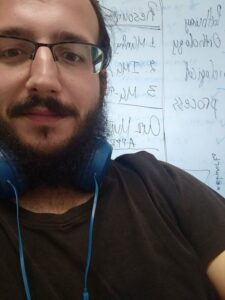
FEMS ALUMNI BULLETIN SEPTEMBER 2020
Meeting Attendance Grants enable early career researchers to attend microbiology meetings worldwide to network, collaborate and keep abreast of new developments in their field.
 Haris Zafeiropoulos, Institute of Marine Biology, Biotechnology and Aquaculture (IMBBC) – Hellenic Centre for Marine Research (HCMR), Crete, Greece
Haris Zafeiropoulos, Institute of Marine Biology, Biotechnology and Aquaculture (IMBBC) – Hellenic Centre for Marine Research (HCMR), Crete, Greece
Attended: Metagenomics, metatranscriptomics, and multi’omics for microbial community studies
Dates: 1-5 June 2020 (an online course)
Member Society: Society of Mikrobiokosmosles.
Our world is in constant crisis. The relationship between our community and nature is among the most pressing problems of our time. Comprehending ecosystems’ ecology can help us address a wide range of issues in a variety of aspects, both scientific and societal. And that is why I chose to focus my research curiosity on elucidating ecosystem function. In 2016, I completed my BSc in Biology at NKUA. By the time I had realized the great part Bioinformatics play in modern biology. I joined the Bioinformatics MSc program in the UoC in 2016. During my master thesis, I became a member of lab42open at IMBBC-HCMR. Since then, I have developed PEMA, a pipeline for the analysis of metabarcoding data; selected by LifeWatch – ERIC for the analysis of the ARMS derived data. I am now conducting my PhD on microbial interactions and ecosystem functioning. I intend to merge analyses of different types of NGS data, knowledge aggregation and data integration, along with network analysis, to end up with promising hypotheses regarding how ecosystems work and what we could do to restore the balance. My research interests focus on microbial ecology and ecosystem functioning at the microbial dimension; as each and every ecosystem type is based on the microbes hosted. Thus, bioinformatics is nothing but a means to an end? Sure not. It’s my everyday life and it is fantastic.
The main aim of the course was to provide a thorough introduction to microbial community data analysis (metagenomics, metatranscriptomics, and other culture-independent molecular data). We, the participants, learnt how to process data from raw meta’omic sequencing files through appropriate bioinformatic methods and approaches for subsequent integrative statistical analyses. As funding in Greece is limited, especially for PhD students, external funding is almost always necessary for attending to courses like this. My goal was to get a thorough introduction in meta’omics analyses.
This way I will be able both to implement such analyses of my own and meta-analyses using already publicly available analyses.
Without the FEMS Meeting Attendance grant, my attendance to the course would have been difficult. The course was an excellent introduction in the meta’omics analyses and allowed me to discuss topics of my research interest with a great number of researchers in the field.
Thank you very much once again for this opportunity.




